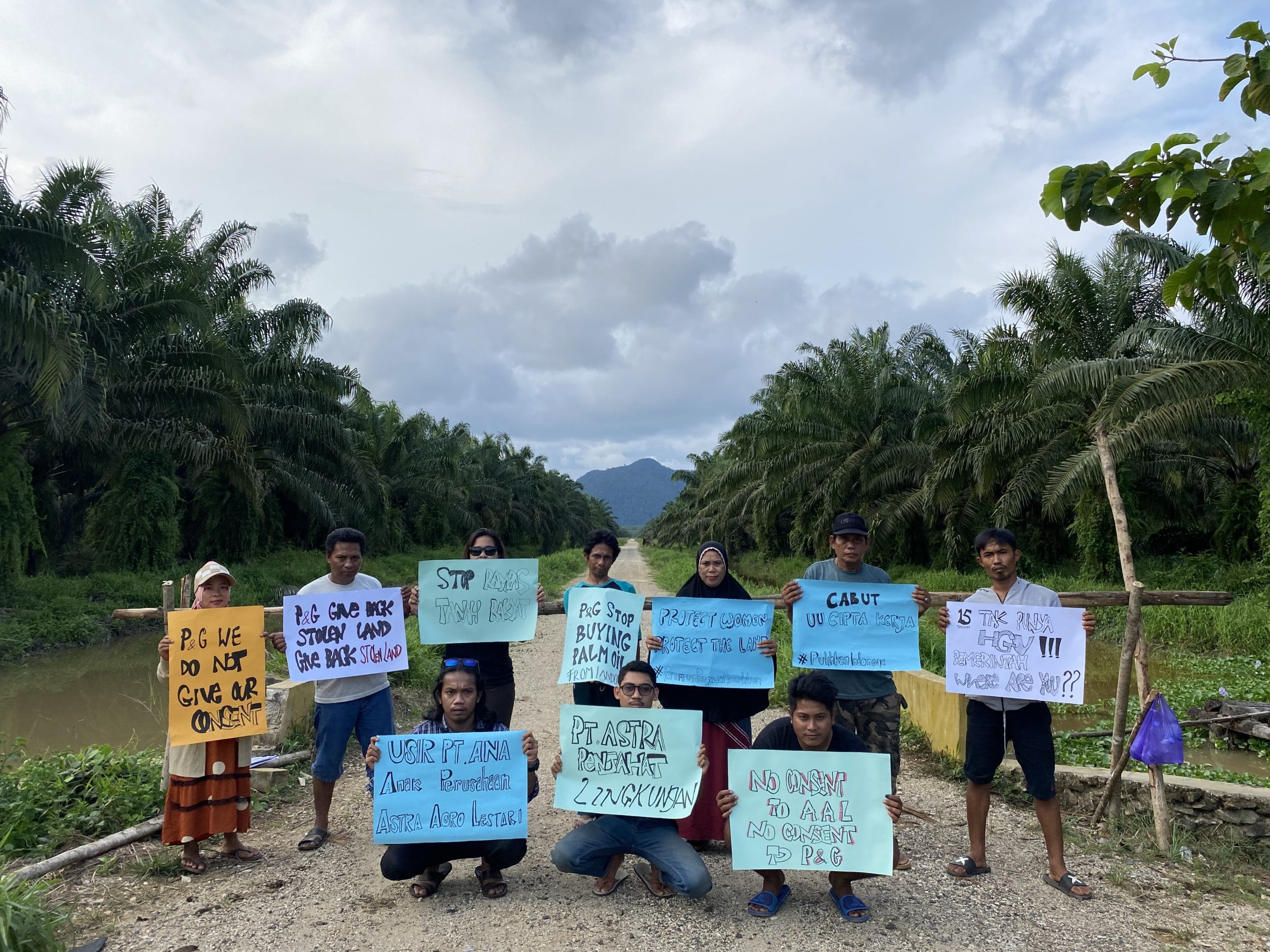
Procter & Gamble Sources Suffering from Indonesia’s Forests
What do shampoo, soap, and shaving cream have to do with violent land grabbing and forest destruction? Just follow the flow of palm oil from plantations in Indonesia to Procter & Gamble – the corporate giant that makes household products such as Head & Shoulders, Old Spice, and Gillette.
In September 2020, WALHI – the largest environmental network in Indonesia – wrote to P&G about widespread environmental and human rights violations in Central and West Sulawesi, Indonesia, by one of P&G’s palm oil suppliers – Astra Agro Lestari (AAL). WALHI urged P&G to stop sourcing from AAL due to ongoing abuses and illegalities in company operations, while requesting an independent meeting with the consumer giant. Eighteen months later, P&G has yet to meet directly with WALHI or affected communities. Meanwhile, local farmers continue to have their rights violated, their land stolen, and their water polluted as they bear the brunt of an industrial plantation model predicated on environmental destruction and subjugation.
A report released today by Friends of the Earth US and WALHI finds that AAL and its plantation subsidiaries are embroiled in protracted land conflicts with local communities and responsible for a host of environmental and human rights abuses. AAL and its subsidiaries are accused of violent land-grabbing, driving illegal forest encroachment, and are responsible for water pollution that negatively affects local livelihoods. Notably, none of the AAL plantation companies have received the consent of communities to operate on their lands. Local farmers claim that thousands of hectares have been usurped, pointing to their registered land titles as evidence of rightful ownership.
In the face of these injustices, farmers have fought back, uprooting oil palm trees planted on their lands. Land defenders such as Franz Hemsi have endured intimidation, jail time, and death threats. Community members allege that AAL’s plantation companies have shown up with paramilitary forces, indiscriminately shooting at residents and jailing others.
Globally, repression against environmental human rights defenders like Hemsi is on the rise. In 2020, at least 227 defenders were killed worldwide for seeking to protect their traditional lands, with agribusiness being one of the deadliest sectors. These grim realities are the dark side of consumer supply chains that companies like P&G would rather obscure.
In recent years, P&G has come under increasing pressure to address deforestation, primary forest loss, and violations of Indigenous Peoples’ rights across its supply chains. In 2020, 67 percent of voting shareholders supported a resolution calling on the company to increase its efforts to eliminate deforestation and degradation from its supply chains. Unfortunately, since then, P&G has failed to adopt meaningful policies and practices that prevent forest loss and respect the rights of communities, including the right to provide or withhold their consent to business operations on their land.
At the same time, several of P&G’s palm oil suppliers are linked to gross human rights abuses. P&G’s joint venture partner FGV continues to endure a withhold release order on its palm oil imports into the United States due to ongoing labor violations. Another direct P&G supplier, Sime Darby, had a similar petition filed with US authorities to block palm oil imports over forced labor concerns. Despite being alerted to AAL’s violations in 2020, P&G has failed to hold their supplier accountable, while continuing to maintain business relationships with several shady companies.
It’s not just palm oil. In Canada, P&G’s supply chains are responsible for destroying virgin forests for its Charmin toilet paper brand. Canada’s boreal forests are home to Indigenous communities and endangered caribou habitat. They store hundreds of billions of tons of carbon, serving as one of the planet’s most important carbon sinks and thereby mitigating some of the worst impacts of the climate crisis. Yet, P&G has ignored advocates’ calls to stop sourcing from this precious ecosystem, despite a growing number of alternatives for recycled and post-consumer content tissue and toilet paper.
P&G isn’t the only company tied to AAL’s Indonesian land grab. Over a dozen consumer companies, including PepsiCo, Unilever, and Nestle, as well as the world’s largest agribusiness traders Bunge and Archer-Daniels-Midland, source conflict palm oil from AAL’s problematic plantations.
P&G wants to portray itself as a leader in “sustainability.” The latest Friends of the Earth report shows that despite cosmetic changes to its policies, suffering and injustice continue to be main ingredients in P&G’s household products.
Related Posts
Ways to Support Our Work

Read Latest News
Stay informed and inspired. Read our latest press releases to see how we’re making a difference for the planet.

See Our Impact
See the real wins your support made possible. Read about the campaign wins we’ve fought for and won together.

Donate Today
Help power change. It takes support from environmental champions like you to build a more healthy and just world.